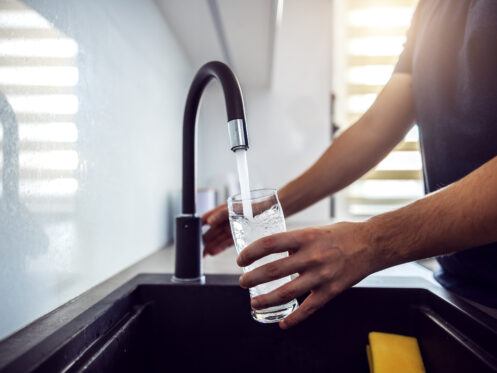Debating between a water softener or a water filter? Are you unsure which one is the right fit for your home? When it comes to improving water quality, the right system can make all the difference.
What is a Water Softener?
A water softener is a device that transforms the way we experience one of our most valuable resources: water. Picture a world where you no longer have to grapple with the exasperating consequences of hard water. Imagine your appliances lasting longer, your clothes feeling irresistibly soft, and your everyday cleaning tasks becoming effortless. That’s precisely what a water softener can deliver.
What exactly does a water softener do? At its core, it is a system meticulously crafted to eliminate the minerals and impurities that give water its “hard” attributes. From unsightly limescale buildups on faucets, showerheads, and pipes, to decreased soap effectiveness and premature wear and tear on appliances, the consequences of hard water can be frustrating and financially burdensome.
The primary function of a water softener is to conduct a process known as ion exchange, which efficiently reduces the mineral concentration in water. The most commonly employed water softener is a salt-based ion exchange system comprising two essential components: a mineral tank filled with resin beads and a brine tank containing salt.
When hard water enters the mineral tank, it comes into contact with the resin beads. These beads have a negative charge, attracting the positively charged calcium and magnesium ions in the water. As the water courses through the resin, the calcium and magnesium ions swap with sodium ions present in the resin, effectively softening the water. The softened water then flows out of the tank and into your plumbing system, readily available for all your domestic or commercial needs.
Over time, the resin beads become saturated with calcium and magnesium ions, necessitating regeneration. This is where the brine tank comes into play. During the regeneration cycle, a potent brine solution flushes through the mineral tank, displacing the accumulated minerals and rejuvenating the resin beads with sodium ions. The displaced minerals and excess brine solution are purged from the system, which primes the resin beads for the subsequent cycle.
The benefits of using a water softener are numerous and far-reaching. One of the most noticeable advantages is the prevention of limescale buildup. Limescale can wreak havoc on your plumbing fixtures, appliances, and even your beloved coffee maker. By significantly reducing limescale accumulation, a water softener helps extend the lifespan of your appliances, saving you a considerable amount of money on repairs and replacements.
Hard water can impede soap’s lathering and cleansing capabilities, which means that you’ll need to use more to achieve the desired results. Soft water, on the other hand, allows soap to lather effortlessly for superior cleaning performance and reduced soap consumption. You’ll observe the difference in your laundry with clothes emerging luxuriously soft and vibrant. Your spotlessly clean dishes and gleaming bathrooms will also attest to the power of a water softener.
Energy efficiency also receives a considerable boost when utilizing a water softener. Appliances like water heaters and boilers that operate with hard water endure reduced efficiency due to limescale buildup on heating elements. This buildup acts as an insulator, making it more challenging for the appliance to heat water efficiently. By eliminating this limescale, water softeners enable appliances to operate at their optimal level, leading to energy savings and lower utility bills.
What is a Water Filter?
A whole-home water filter is like having a personal water guardian for your entire home. It’s an advanced system that goes above and beyond to ensure that the water you use each day is clean, pure, and safe. Instead of just filtering water at specific faucets or appliances, this powerhouse of a filter protects your entire plumbing system from the moment water enters your home.
When it comes to filtration, a whole-home water filter doesn’t mess around. It employs a sophisticated multi-stage process that combines different technologies to target a wide range of contaminants. From sediments and chlorine to heavy metals and volatile organic compounds (VOCs), this filter tackles them all, leaving you with water that not only looks and smells great but also tastes amazing.
One of the most notable benefits of installing a water filter is that there are no more worries about chlorine, which can give water an unpleasant taste and odor. With a whole-home filter, you’ll cut chlorine and its by-products for better-tasting water that you’ll love to drink.
Not only does a whole-home water filter benefit your health, but it also has positive impacts on your plumbing system and household appliances. By removing sediments and other particles, a filter can prevent clogging and potential damage and extend the lifespan of your pipes, faucets, and water-using appliances. No more dealing with mineral deposits and stubborn stains on your dishes and laundry. Cleaner water means cleaner results and less time spent scrubbing and descaling.
Water Softeners vs. Water Filters
Both of these systems are designed to enhance your water but serve different purposes and target different aspects of water quality.
Let’s begin with water softeners, which primarily address the common issue of hard water. Hard water has high concentrations of dissolved minerals, particularly calcium and magnesium. This can lead to several problems, such as scale buildup in pipes and appliances, reduced efficacy of soaps and detergents, and even the potential for dry skin and lackluster hair after showering. Water softeners use an ion exchange process to replace calcium and magnesium ions with sodium or potassium ions, effectively softening the water and mitigating the associated issues.
On the other hand, water filters remove impurities and contaminants from the water supply. These can include sediments, chlorine, heavy metals, pesticides, bacteria, and other potentially harmful substances. Water filters employ various techniques, including activated carbon filtration, sediment filtration, reverse osmosis, and ultraviolet disinfection, to specifically target and eliminate contaminants for cleaner and safer water for both drinking and general household use.
Deciding which system is best suited to your needs depends on your specific water quality concerns and preferences. If you are experiencing problems associated with hard water, you might prefer a water softener. Water softeners prevent mineral deposits and can extend the lifespan of your plumbing system and appliances.
However, if your primary objective is to remove contaminants and impurities from your water supply, a water filter is the ideal choice. Whether you opt for a point-of-use filter installed at specific faucets or a comprehensive whole-home water filter, these systems will tackle a wide range of contaminants, ensuring cleaner and safer water for drinking, cooking, and general household use.
You might also want to address hard water and impurities, which means a two-pronged approach could better serve your needs. You can install a water softener first followed by a filtration system.
Contact Us Today!
At Bacon Plumbing Heating Air Electric in Plano, Texas, we provide water filtration services for your whole home, water heater flushes, and water softener installation services for your home. Our friendly team also provides cooling, heating, and plumbing services. Contact Bacon Plumbing Heating Air Electric for more information today!




